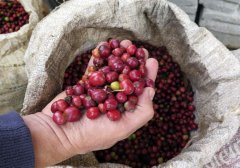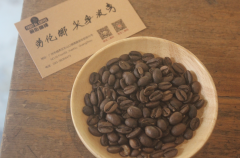Do you want sugar in your coffee? what kind of sugar is appropriate?
For professional baristas, please follow the coffee workshop (Wechat official account cafe_style)

Sugar can be divided into white sugar, brown sugar and yellow sugar according to color. The difference in color is due to the different degree of removal of impurities in the sugar-making process. White sugar is refined sugar, the purity is generally more than 99%; yellow sugar contains a small amount of minerals and organic matter, so it has color; brown sugar is unrefined crude sugar, the color is very dark.
Generally speaking, white sugar and yellow sugar are suitable for seasoning in coffee or black tea, and yellow sugar is often used in cooking dishes. Yellow sugar contains more nutrients, which has the effect of tonifying blood and warming the stomach; white sugar has a clearer taste, cooler and better color.
There are mainly three kinds of sugars for coffee: yellow sugar (sucrose), white sugar (refined sugar) and cube sugar (crystal refined sugar compression drying).
Most people have a consensus on the answer of drinking milk tea with white sugar, but there is more debate about whether to drink coffee with white sugar or brown sugar. Espresso from Europe traditionally contains granulated sugar, or even powdered sugar finer than granulated sugar. However, coffee culture has spread to Asia, first to Japan and Taiwan, and then to Hong Kong and even mainland China. The concept of coffee and sugar and milk has become very common, and it has not been said that white sugar or brown sugar is traditional and authentic, and the choice of sugar can be determined by individual taste.
As for whether putting white sugar and yellow sugar has any effect on the taste of coffee, the answer is yes, the principle is the same as putting seasoning in the kitchen. If brown sugar refers to Raw Sugar rather than dyed so-called "yellow sugar", the sugar itself has the sweetness of sugar cane, and the addition of coffee will give the coffee a slight taste of sugar cane and caramel, while refined granulated sugar will only add pure sweetness to the coffee.
Yellow sugar is generally thicker than white granulated sugar. Will slow dissolution affect the taste of coffee? The roughness of brown sugar commonly used in the market has little effect on the taste of coffee. In fact, in addition to granulated sugar and brown sugar, you can also try to find out the difference in the taste of coffee with honey, maple sugar and black sugar. Even supermarkets sell all kinds of blended coffee sugar. Generally speaking, coffee lovers prefer sugar because the ingredients are more natural and contain fewer additives, and most people think that they are healthier. In terms of sweetness, the sweetness of white granulated sugar comes directly, but modern people pay attention to health, and sucrose, which has a low refined system, has become the choice of many people.
Cube sugar, also known as semi-cube sugar, generally refers to white sugar, which is processed by refined sugar. it is characterized by pure quality, white and glossy, complete edges and corners, proper firmness, not easy to break, but dissolves quickly in water, and the solution is clear and transparent.
Some people say that "there is no sugar in good coffee" or "people who can drink coffee don't put sugar in it". In fact, tasting coffee without sugar or milk is one of the ways to know the taste of coffee, but it cannot be judged by this method alone that people who put sugar and milk will not drink coffee. The purpose of putting sugar in coffee is to subtract bitterness, whether to put sugar or not, or which kind of sugar can be put according to mood. Coffee tasting this kind of leisurely activity is the most comfortable.
Benefits:
1. Coffee contains certain nutrients. Coffee beans contain sugars, protein, fat, nicotinic acid, potassium, crude fiber, moisture and other nutrients.
two。 Coffee is good for the skin. Taking a bath with coffee powder is a kind of thermotherapy, which has the effect of losing weight.
3. Coffee can promote metabolic function and activate digestive organs.
4. Coffee has the function of relieving alcohol. Drinking coffee after drinking alcohol will quickly oxidize the acetaldehyde converted from alcohol, decompose it into water and carbon dioxide and discharge it out of the body.
5. Coffee can relieve fatigue.
6. Coffee can prevent gallstones.
7. Drinking coffee regularly can prevent radiation damage.
8. Coffee protects the heart and blood vessels.
9. Coffee is refreshing.
10. Coffee is anti-melancholy, a small amount of coffee can cheer people up, feel happy, and relieve the melancholy phenomenon.
11. Coffee has a diuretic effect, which can increase the amount of urination, thus increasing the number of times to go to the toilet.
twelve。 Coffee can improve constipation, stimulate gastrointestinal hormones or peristaltic hormones, produce laxative effect, and can be used as a rapid laxative.
13. Coffee can relieve pain, and when caffeine is used as a medicine, it can enhance the effect of some painkillers.
14. Coffee has the functions of anti-oxidation and heart protection, strengthening muscles and bones, benefiting waist and knees, appetizer, eliminating fat and accumulation, promoting orifice and dehumidification, promoting blood circulation and removing blood stasis, relieving wind and relieving spasm and so on.
Disadvantages:
1. Coffee can increase the risk of heart disease.
two。 Causing nervousness. For people with anxiety disorders, caffeine can worsen symptoms such as sweaty palms, palpitations and tinnitus.
3. Coffee can cause blood pressure to rise and cause the walls of blood vessels to contract.
4. Induced osteoporosis caffeine itself has a good diuretic effect. If you drink a lot of coffee for a long time, it is easy to cause bone loss and adversely affect the preservation of bone mass.
5. Caffeine can increase stomach acid, and continuous high doses can lead to peptic ulcers, erosive esophagitis and gastroesophageal reflux disease.
6. Caffeine poisoning includes addiction and a range of physical and psychological side effects, such as nervousness, irritability, anxiety, tremors, muscle convulsions (hyperreflexia), insomnia and palpitations.
7. Caffeine also reduces a woman's chances of becoming pregnant, increases the risk of miscarriage and slows fetal growth.
Drinking coffee with or without sugar is a matter of taste and won't do any good or harm to your health. My suggestion is that if you are not used to the bitter taste of coffee, you can add a little milk, but never add sugar, because sugar will interfere with the aroma of coffee.
Important Notice :
前街咖啡 FrontStreet Coffee has moved to new addredd:
FrontStreet Coffee Address: 315,Donghua East Road,GuangZhou
Tel:020 38364473
- Prev

The grinding of coffee is a big factor, so what should we pay attention to?
Professional coffee knowledge exchange more coffee bean information Please follow the coffee workshop (Wechat official account cafe_style) in the Middle East, people still use mashing methods to beat beans into particles of different sizes, but when most people have gradually used bean grinders, Bella-Shavalin personally did an experiment, which is better to mash or to grind, both for public trust and for public trust.
- Next

What is Laurena's pointed bourbon? what is the flavor of the pointed bourbon coffee that was once extinct?
Professional coffee knowledge exchange more coffee bean information please follow the coffee workshop (Wechat official account cafe_style) when it comes to decaf coffee, people basically think of decaf coffee that has been specially treated to reduce its caffeine. In fact, there is such a natural caffeine content in nature.
Related
- What is the difference between Indonesian Sumatra Mantinin coffee and gold Mantinin? How to distinguish between real and fake golden Mantelin coffee?
- What does bypass mean in coffee? Why can hand-brewed coffee and water make it better?
- Unexpected! Ruixing Telunsu lattes use a smoothie machine to foam milk?!
- % Arabia's first store in Henan opens into the village?! Netizen: Thought it was P's
- Does an authentic standard mocha coffee recipe use chocolate sauce or powder? Mocha Latte/Dirty Coffee/Salty Mocha Coffee Recipe Share!
- What is the difference between Vietnam egg coffee and Norway egg coffee? Hand-brewed single product coffee filter paper filter cloth filter flat solution!
- What is the difference between sun-cured and honey-treated coffee? What are the differences in the flavor characteristics of sun-honey coffee?
- How to make Italian latte! How much milk does a standard latte use/what should the ratio of coffee to milk be?
- How to make butter American/butter latte/butter Dirty coffee? Is hand-brewed coffee good with butter?
- Is Dirty the cold version of Australian White? What is the difference between dirty coffee/decent coffee and Australian white espresso?

